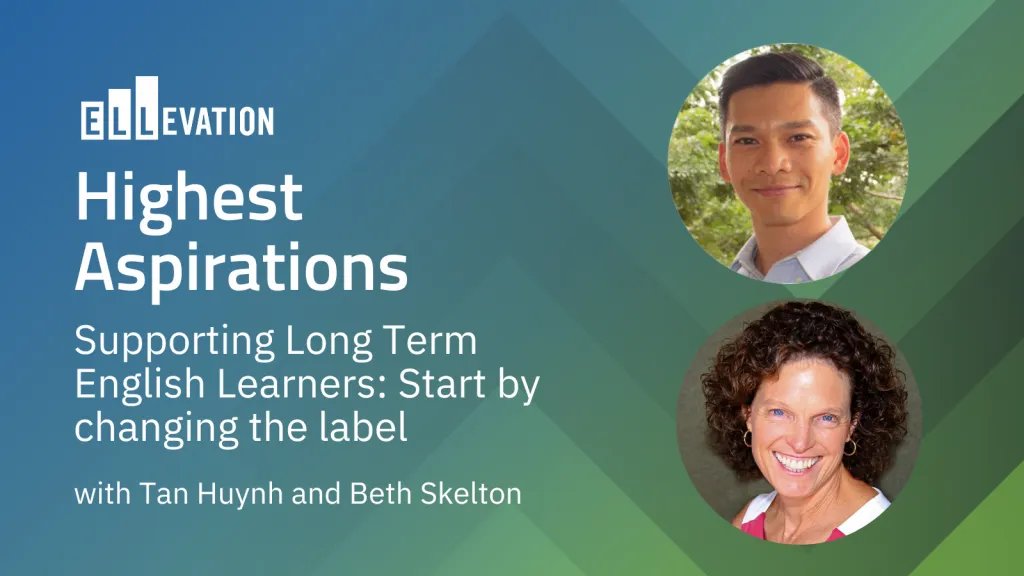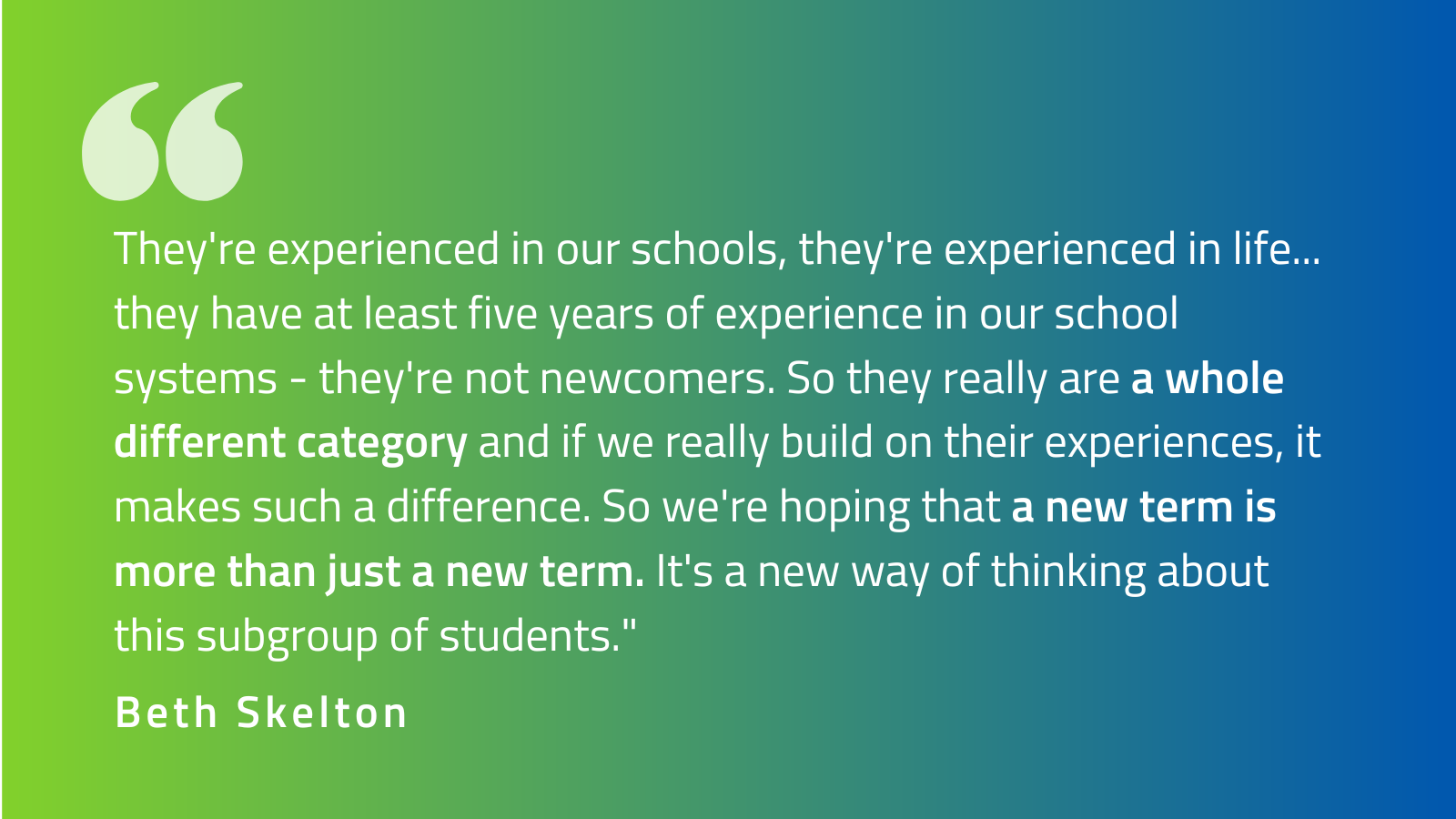Supporting Long Term English Learners: Start by changing the label


Supporting Long Term English Learners: Start by changing the label
Education is full of labels and acronyms. Long Term English Learner, known by most as LTEL, is a label that has perhaps the highest implications on academic and professional success. LTELs are an area of focus in many school districts because the data and research are clear - exiting the EL program (or reclassifying in some places) is a key lever we need to pull to ensure long-term success of multilingual learners. But what limiting outcomes does the current term have for the students we are labeling? Tan Huynh and Beth Skelton join us to explore this topic.
Tan Huynh is a secondary school teacher specializing in English language acquisition at international schools, an author, podcaster, and consultant. Beth Skelton has over 30 years of experience as a language educator and holds a master’s degree in multicultural teacher education. She has worked with early childhood, elementary, middle, high school, and adult language learners in rural, urban, suburban, and international school settings.
We sat down with them to dig into the impact that the label “LTEL” can have on students and strategies that teachers and schools can use to create an environment where multilingual learners can thrive.
Listen to the full episode here or find a few highlights from our conversation below.
How is the current term (Long Term English Learner or LTEL) deficit-based and potentially negatively impacting students’ educational outcomes?
By naming this population of students with the current term, we are really describing them in a negative way by focusing on what they lack rather than what they bring. Tan and Beth explain that students labeled as LTEL tend to stay in a “negative whirlpool of low expectations” with less access to challenging classes and opportunities to attend elective classes than other students. This may result in having to attend additional English classes. Ultimately the label becomes a structural barrier, as well as a major mental roadblock as students might think of themselves as less capable than their peers because of their label.
“These deficit-based adjectives come attached to that label. It's almost like they go together, unmotivated, struggling, not caring, not trying. I mean all of these adjectives that just somehow are glued to the label,” shares Beth.
Additionally, the old term is focused on the English part, as though students are only coming to school to learn English and that is the highest achievement they are reaching for. Ultimately the label and the mindset that accompanies it are penalizing students for learning English at a different pace, while completely disregarding the host of strengths and experiences these students already possess.

What alternative term do you propose to LTEL?
Tan and Beth explain their reasoning behind selecting the term “experienced multilingual”, which comes from Dr. Maneka Brooks, an expert in the field focused on students currently classified as long-term English learners.
“She proposed experienced multilinguals because we're first focusing on the multilinguals, as in they know multiple languages. The experience piece shows how they can use all these languages - they have the experience of many years of switching between languages of using this word for that context, using these sentences for that situation. That linguistic awareness is an asset that only comes from experience,” Tan explains.
Their new book that comes out in May of 2023 is titled accordingly Long-Term Success for Experienced Multilinguals. Their hope is that by reframing how we think about this population of students, we can move towards creating a more equitable and positive educational experience for all where language learners’ assets are at the forefront of our planning and interactions.
“Our students will have long-term success if we create the conditions for that long-term success. “Like in an orchard... there are lots and lots of inputs until you get the fruit... It's a process of continually creating the conditions. This term takes a twist on the deficit lens of long-term and makes it positive. It's really about success beyond the classroom and into their lives,” says Beth.
What strategies can be used for a school wide implementation of these practices that foster an environment where all multilingual learners can thrive?
Tan and Beth emphasize that in order for support to be rolled out school wide, leadership needs to be involved and make it a priority. One of the most effective ways they suggest organizing is by working across departments in order to keep the content as the driver while uncovering the hidden curriculum within content classes that is language based. Some specific strategies they suggest during the conversation include:
- Analyze student work during planning times - What language are you seeing on the exit ticket? What does the language tell you about their comprehension and their ability to express themselves?
- Try out lesson studies - As a department, teams can plan a lesson and bring in an ELD teacher to co-plan with language included. The team then will watch/observe during the lesson to see how students are able to access content. Finally the teachers that observed can use the same lesson and apply those learnings when they try it in their own classroom.
By expanding these best practices that benefit experienced multilinguals beyond just particularly motivated teachers’ classrooms to becoming department or school wide, we can create equitable conditions where all students have access to high quality learning experiences.
Download the full episode transcript here.
Episode resources:
- Tan and Beth’s book Long-Term Success for Experienced Multilinguals, use discount code C23104 for 25% off for U.S. address only
- Link to the webinar: https://www.englishlearnerportal.com/experienced
- Engaging Students in Academic Literacies: Genre-based Pedagogy for K-5 Classrooms by Maria Estela Brisk
- Teaching Language in Context by Beverly Derewianka and Pauline Jones
- Small Moves, Big Gains by Nancy Motley
- The Writing Rope by Joan Sedita
- Don Vu: Life Literacy and the Pursuit of Happiness